Amanda Sloat outlines the charges against Reza Zarrab and his co-defendants, and explains why Turkish officials are claiming the trial is a conspiracy by an Islamic cleric. She reviews how the U.S. administration has handled the case, and considers the trial’s potential impact on Turkey and bilateral relations. This piece originally appeared on Lawfare.
In recent weeks, there has been increasing American interest in a previously little-watched judicial saga unfolding in New York district court. Like a Turkish soap opera, it involves a dashing businessman with a pop-star wife, corruption allegations, leaked tapes of private conversations and intrigue at the highest levels of government. The trial of Reza Zarrab on charges of evading Iran sanctions, including any revelations he makes about corruption in the Turkish government, could have significant political and economic implications for Turkey. It could also damage already fraught relations between Turkey and the United States.
This article seeks to unravel and connect the multiple threads in the complex Zarrab case. It begins by outlining the charges against Zarrab and his co-defendants, and it explains why Turkish officials are claiming the trial is a conspiracy by an Islamic cleric. It then reviews how the U.S. administration has handled the case, including outreach by the Turkish president to senior American officials on Zarrab’s behalf. The article concludes by considering the trial’s potential impact on Turkey and bilateral relations.
Who is Reza Zarrab?
Reza Zarrab is a Turkish-Iranian businessman. He was arrested in March 2016 in Miami while ostensibly en route to Disneyland with his family. Charged in U.S. District Court in New York, Zarrab is accused of laundering money and helping the Iranian government circumvent U.S. economic sanctions intended to deter its nuclear weapons program. Zarrab allegedly shipped gold to Iran in exchange for oil and natural gas, the “gas for gold” scheme; this gold helped Iran prop up its ailing currency.
Prosecutors allege Halk Bank, owned by the Turkish state, facilitated the transfers by disguising the nature of the transactions and labeling them as permissible commerce. The bank’s deputy chief executive officer, Mehmet Hakan Atilla, was arrested in New York in March 2017 and charged with helping Zarrab conspire to evade sanctions on Iran.Four other Turkish officials, including former Economy Minister Zafer Caglayan and Halk Bank Deputy General Manager Suleyman Aslan, were indicted in early September for accepting bribes to promote and protect the scheme, laundering funds and violating sanctions. All deny the charges.
In recent days, questions have arisen about Zarrab’s whereabouts. The U.S. Bureau of Prisons website indicated he was released on November 8, and the Turkish foreign ministry contacted U.S. officials to ask his location. Speculation is rife that Zarrab cut a deal and agreed to become a government witness. He has not participated in pre-trial activities for weeks, nor did he appear in court this week. Although lawyers for Atilla were in court for the start of jury selection on November 20, U.S. District Judge Richard Berman postponed jury selection until November 27 without explanation; a scheduled conference will still take place on November 21.
Why are Turkish officials calling this case a “Gulenist” conspiracy?
As trial preparations began, Turkey’s Deputy Prime Minister Bekir Bozdag claimed Zarrab was a “hostage” being forced to testify against the Turkish government. “The case is political, lacks any legal basis and is a conspiracy against Turkey,” he added. Turkish officials argue prosecutors are relying on evidence fabricated by followers of Fetullah Gülen, who is accused of masterminding the July 2016 coup attempt.
Fetullah Gülen is an Islamic cleric and scholar, seen as the spiritual leader of a transnational religious movement known as “hizmet” (Turkish for “service”). Since Gülen left Turkey in 1999 to avoid political prosecution—with courts later acquitting him of all charges—he has been living in self-imposed exile in Pennsylvania. He was granted permanent legal resident status in 2008.
When Mustafa Kemal Ataturk founded the modern Turkish state in 1923—with secularism as a guiding principle—he relegated Islam to the private sphere and later banned Sufi orders. Many Sufi followers established underground networks, sought government positions, and created international connections as a means of ensuring the group’s survival. Drawn from this tradition decades later, Gülen’s followers formed non-profit organizations (such as the Rumi Forum), founded charter schools in the U.S. and other countries, and pursued senior government jobs.
After the pro-Islamist Justice and Development party (AKP) came to power in 2002, Gülen actively cooperated with then-Prime Minister Recep Tayyip Erdoğan. They shared a goal of ridding the government and military of the Kemalists and secularists who operated a “deep state” within Turkey. Gulenist police and prosecutors—with Erdoğan’s backing—pursued an alleged network (known as Ergenekon) accused of conspiring to overthrow the AKP government. Hundreds were imprisoned, and dozens of show trials were held. Most of the suspects were later acquitted by an appeals court given lack of proof, fabricated evidence and illegal wiretapping.
A power struggle began once Erdoğan and Gülen no longer had a common enemy. The tension began in 2011, when Erdoğan refused to include dozens of Gulenists on AKP party lists for the parliamentary elections. In 2012, Gulenists opposed Erdoğan’s peace talks with the PKK (the Kurdistan Workers’ Party, a designated terrorist organization engaged in armed conflict with the Turkish state). In November 2013, Erdoğan closed Gulenist “prep schools” that prepared students for higher exams; they were also used for fundraising and recruitment.
In December 2013, Turkish police launched corruption investigations based on leaked wiretaps into four government ministers accused of receiving bribes from an Iranian gold trader: Reza Zarrab. Separately, Erdoğan’s son, son-in-law and current Prime Minister Binali Yıldırım were investigated for corruption amid leaks of secretly recorded phone calls. It was widely believed Gulenist police and judicial officials were behind the probes. Erdoğan successfully fought back, getting Zarrab out of prison and the charges dropped. Turkish officials have criticized American prosecutors for basing part of their case against Zarrab and Atilla on evidence from this period.
Following this scandal, Erdoğan aggressively pursued Gülen and accused his followers of operating a “parallel state.” In an effort to cleanse government and society of Gulenist influence, the Turkish government closed Gulenist newspapers and television stations, seized companies belonging to Gülen’s supporters and purged hundreds of government officials—including arresting all of the prosecutors, police officers, and judges involved in the 2013 corruption probe. In May 2016, the movement was designated a terrorist organization, Fethullah Terrorist Organization (FETO). The government was also expected to purge Gulenists from senior ranks of the military during the annual promotion and rotation period in Aug. 2016; it is unlikely a coincidence the coup attempt occurred several weeks prior. While the Turkish government has repeatedly called on the U.S. to extradite Gülen for allegedly orchestrating the putsch—and provided 85 boxes of documents as evidence for the extradition—Justice Department lawyers have not seen sufficient proof of his complicity to persuade a federal judge of probable cause.
How has the U.S. administration handled Zarrab’s case?
In events surrounding Zarrab’s trial, interactions between the U.S. government and Turkish officials raise rule of law questions for the United States. Erdoğan has taken a strong personal interest in Zarrab, discussing him on multiple occasions with the Obama and Trump administrations. He demanded Zarrab’s release and Bharara’s firing in a meeting with then-Vice President Biden in 2016, while his wife pleaded the case to Biden’s wife. Erdoğan raised Zarrab in his final phone calls with Obama in Dec. 2016 and Jan. 2017. It was a topic of discussion between Erdoğan and Trump as well. Following a September phone call, Erdoğan said Trump told him the case in New York was not under his jurisdiction.
Eyebrows have been raised over connections between the Zarrab case and the Trump administration. In March, Trump fired Preet Bharara, the U.S. District Attorney who brought the indictment against Zarrab. (Attorney General Jeff Sessions asked 46 U.S. attorneys to resign. Bharara refused, noting Trump had asked him after the election to remain. Trump called Bharara; he declined to answer, citing rules against sitting attorneys talking to the president. Trump then fired him.) The case has continued under Bharara’s former deputy and current Acting District Attorney, Joon Kim.
Also in March, Zarrab made changes to his legal team. He hired Rudy Guiliani, an informal Trump advisor, and Michael Mukasey, a former Attorney General. These lawyers met with Erdoğan and senior Trump administration officials in search of a “diplomatic solution.” Guiliani described his role in a deposition as determining “whether this case can be resolved as part of some agreement between the United States and Turkey that will promote the national-security interests of the United States and redound to the benefit of Mr. Zarrab.”
In addition, there are questions about Michael Flynn’s possible involvement. Special Counsel Robert Mueller, who is investigating Russian interference in the U.S. presidential election, is exploring Flynn’s Turkish activities. Flynn, a Trump campaign advisor and briefly U.S. National Security Advisor, was allegedly offered $15 million to return Gülen to Turkey. Mueller is reportedly examining whether Flynn also discussed ways of freeing Zarrab from court charges.
How will the trial affect Turkey and bilateral relations?
Bilateral relations between the United States and Turkey are poor, in part because of Turkish unhappiness with U.S. failure to extradite Gülen and U.S. cooperation with Syrian Kurdish forces linked to the PKK in the fight against the Islamic State. The countries recently suspended the issuance of visas for each other’s citizens. American action followed the arrests of two Turkish employees of U.S. consulates: one in Adana accused of links to Kurdish terrorists and one in Istanbul accused of ties to Gulen. The Turkish government then took reciprocal measures. In addition, there are 12 Americans in Turkish prisons on spurious terrorism charges, including pastor Andrew Brunson accused of supporting Gülen. Erdoğan appears to be engaging in “hostage diplomacy,” viewing these prisoners as useful bargaining chips for a prisoner swap. Zarrab has also featured highly on the list of bilateral irritants.
The Turkish government is responding to the Zarrab trial as it did the 2013 domestic investigation: discrediting the evidence, impugning the motives of prosecutors and describing it as a Gulenist conspiracy. This effort seeks to delegitimize the criminal accusations by making them appear politically motivated. In March, Prime Minister Yıldırım described the arrest of Halk Bank’s Atilla as “another plan and trick of the Gülen movement.” Pro-government newspaper Daily Sabah reported having “concrete evidence” linking Bharara and Judge Berman to the movement. The Istanbul Public Prosecutor’s office claimed the Turkish Justice Ministry did not provide information from the 2013 case to U.S. authorities, so it has launched an investigation into how Bharara and Kim received recordings and documents. Foreign Minister Mevlut Cavusoglu suggested the charges were “politically motivated.” He said “[Gülen’s network] couldn’t succeed in the coup and they are trying in the U.S. and they are getting support from some U.S. institutions.” (On twitter, Bharara countered: “Turkey FM is a liar. Now let’s see what happens in court.”) Such rhetoric will fuel anti-Americanism in Turkey and further erode public support for the relationship; it will also damage the already poor perception of the Turkish government in the eyes of Congress and others in Washington.
Although Erdoğan is not charged in the American proceedings, any revelations would be personally embarrassing and politically damaging.
Although Erdoğan is not charged in the American proceedings, any revelations would be personally embarrassing and politically damaging. They could implicate those close to him, including his businessman son and energy minister son-in-law. In preliminary court proceedings, American prosecutors said they had evidence of Zarrab’s relationship with Erdoğan: taped conversations of Zarrab seeking Erdoğan’s support for his scheme and evidence of donations by Zarrab to charitable foundations associated with Erdoğan family members.
If American prosecutors can present persuasive evidence—or have Zarrab testify as their witness—it would give legitimacy to previously dismissed allegations. Erdoğan made charges disappear in Turkey, but he cannot do so in the United States. For all its flaws, the American judicial system is still viewed as strong and credible. Turkish observers have seen American courts challenge Trump administration actions, and they have seen the Zarrab case proceed despite Trump firing the original prosecutor. A trial would shine a bright light on alleged corruption in the Turkish government and could undermine Erdoğan’s narrative about rule of law in Turkey. Disclosures would also raise serious questions about the nature of Turkey’s relationship with Iran.
In addition, the trial could harm the Turkish economy. The lira has depreciated in recent months, due in part to the deterioration of U.S.-Turkey relations. Economic challenges could worsen if Zarrab provides damaging information about Halk Bank, other Turkish banks, or the activities of government officials. Such revelations would undermine the international reputation of the Turkish banking system. While businesses may have already accounted for rule of law challenges, an unpredictable political environment could scare off investors. As Erdoğan’s domestic support is partly due to Turkey’s economic success, a weakened economy could hinder his prospects in the 2019 parliamentary and presidential elections.
Although it remains unclear at this time whether Zarrab will participate in the trial as a defendant or a government witness, what he says in court will impact Turkish politics, economics, and relations with the United States. In Turkey, the most damaging allegations involve corruption by senior government officials; their presentation in American court will make them harder to dismiss at home. In the United States, engagement by the Trump Administration has raised troubling questions about its consideration of extra-judicial remedies; perceptions of what was promised could also affect relations between leaders. Thus far, the rule of law is holding here.
Like the best soap operas, the plot continues to thicken. This drama is worth watching.
The Brookings Institution is committed to quality, independence, and impact.
We are supported by a diverse array of funders. In line with our values and policies, each Brookings publication represents the sole views of its author(s).
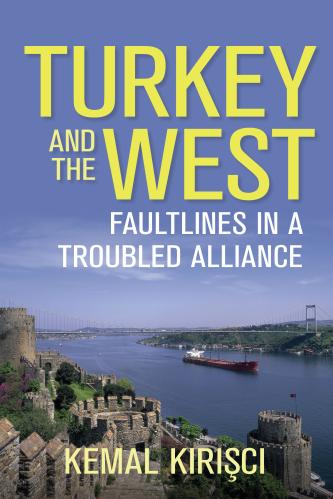
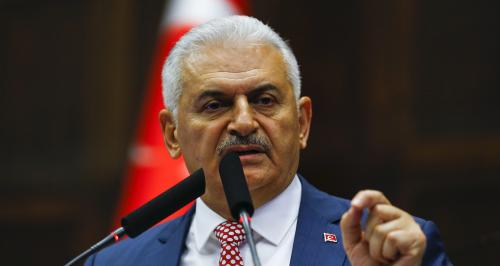
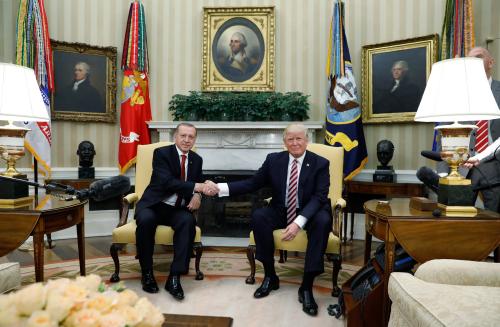
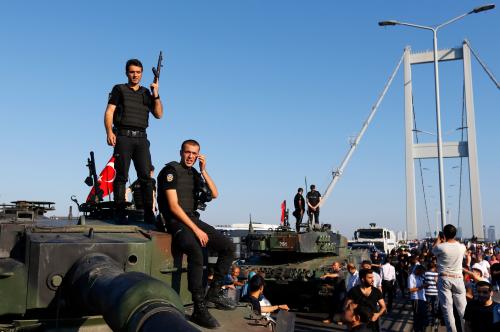

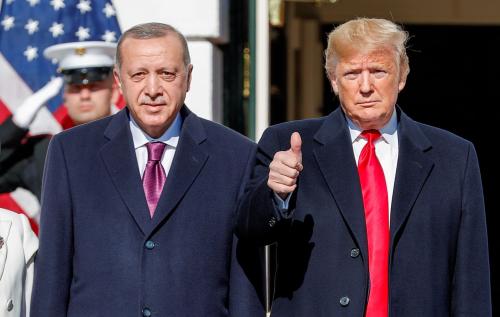

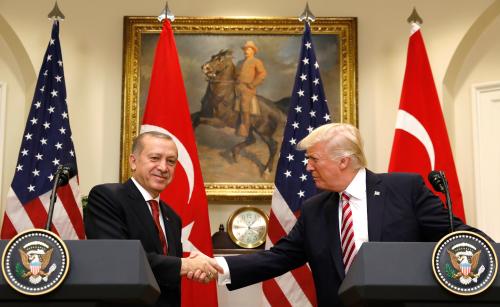
Commentary
Why Turkey cares about the trial of Reza Zarrab
November 22, 2017